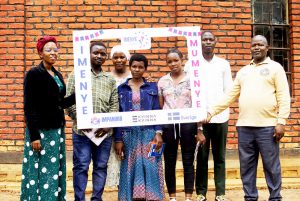Strengthening legal protections for women in marriage: Ongoing challenges in Rwanda
4 min read
As Rwanda celebrates International Women’s Day under the theme “Umugore ni uw’agaciro” (A Woman is of Value), it is an important moment to reflect on the ongoing journey toward gender equality in marriage. While the country has made significant strides in strengthening the legal framework that safeguards women’s rights, challenges persist, particularly in the realm of matrimonial dynamics. This article explores the current legal landscape for women in marriage, celebrates progress, and highlights the challenges that remain.
Legal reforms strengthening women’s rights in marriage
Historically, marriage in Rwanda was structured around patriarchal norms, often leaving women with secondary roles. However, recent legal reforms have redefined marriage as a partnership grounded in mutual respect and equality. The revised Rwandan Family Law (Law No. 71/2024 of 26/06/2024) has reinforced gender equality, with provisions aimed at ensuring that both spouses enter marriage with informed consent, protecting young girls from early and forced marriages, and securing women’s rights within the institution of marriage.

These reforms, while crucial, have not entirely eradicated challenges, especially in rural areas where traditional norms still hold sway. Some women continue to face forced and early marriages, often due to societal pressure and limited access to education. These marriages can prevent young women from pursuing personal development and can perpetuate cycles of economic dependence.
Property rights and economic empowerment
A significant advancement in the new family law is the recognition of equal rights in marriage, particularly in the management of matrimonial property. Article 155 of the law offers various matrimonial regimes, including joint ownership, allowing both partners to share responsibility and control over assets. This provides women with legal protection in case of divorce or widowhood, reducing economic vulnerability.

Furthermore, Article 175 recognizes the value of unpaid domestic labor, such as childcare and housework, which is often performed by women. This acknowledgment ensures that women’s contributions to the household are not overlooked. However, societal norms that continue to undervalue domestic labor can undermine the intended impact of these legal changes. Despite legal protections, women are sometimes still expected to bear the brunt of domestic responsibilities without equal recognition.
Women’s role in marriage decision-making
Rwanda’s evolving legal framework encourages greater equality in decision-making within marriages. Article 205 mandates that couples are informed of their rights and responsibilities before marriage, creating a foundation of clarity and shared expectations. Modern Rwandan marriages, supported by these reforms, are increasingly characterized by mutual participation, with women asserting their voices in family decisions.
Yet, in some households, particularly those influenced by traditional views, women still find it difficult to fully participate in decision-making. This gap between legal reforms and lived realities highlights the ongoing struggle to shift cultural norms that continue to marginalize women’s voices in marriage, despite the legal recognition of their equality.
Divorce and marital disputes
The legal framework also aims to ensure that women are not left vulnerable in cases of divorce or marital disputes. Article 173 of the family law outlines equitable procedures for dissolving marriages, ensuring fairness in property division and protection for children. Women who have spent years performing unpaid domestic work are entitled to a fair share of matrimonial assets, which provides a safeguard against financial insecurity after divorce.

However, the full implementation of these protections is often challenged by limited legal awareness. Women may not be fully informed about their rights or have access to legal representation. Moreover, even with legal safeguards in place, divorced women may still face social stigma, which can hinder their reintegration into society and affect their economic independence.
Evolving social attitudes and shared responsibilities
In addition to legal reforms, there is a gradual shift in societal attitudes toward marriage in Rwanda. The notion of marriage as a partnership, based on mutual respect and shared responsibilities, is gaining traction. Men are increasingly encouraged to contribute to domestic tasks, breaking the longstanding stereotype that housework is solely a woman’s responsibility.

However, there is still resistance in some communities where traditional gender roles are deeply ingrained. Many women continue to carry the disproportionate burden of household responsibilities, limiting their ability to pursue professional ambitions or education. This persistent imbalance highlights the need for broader societal change in how domestic roles are perceived.
Challenges remain
While Rwanda’s legal framework for marriage has evolved significantly, the gap between the law and its implementation remains a critical challenge. Women, particularly in rural areas, still face cultural, social, and economic obstacles that hinder their full participation in marriage as equal partners. Legal reforms alone are insufficient to address these challenges; changes in societal attitudes and greater access to education and legal resources are necessary to fully empower women.

As Rwanda continues to push for gender equality, it is crucial to recognize both the progress made and the gaps that remain. The theme “Umugore ni uw’agaciro” is more than a slogan; it reflects the ongoing struggle for equality and respect in all aspects of life, including marriage.
Editorial



